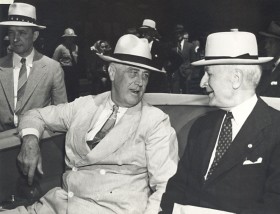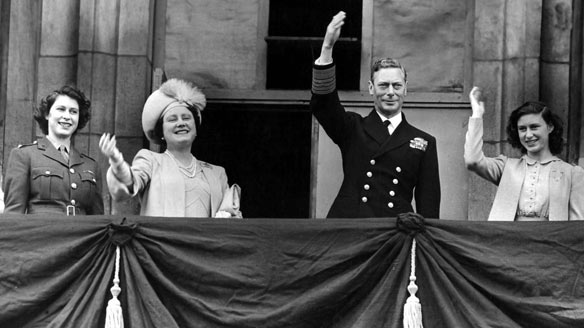US Urged Royals Evacuate To Bermuda In WW2
 US Secretary of State Cordell Hull implored Canadian Prime Minister MacKenzie King to act as an intermediary on America’s behalf in May, 1940 and persuade King George VI to evacuate from a beleaguered Britain — then vulnerable to a Nazi invasion — and relocate to Bermuda for the duration of World War Two [1939-1945].
US Secretary of State Cordell Hull implored Canadian Prime Minister MacKenzie King to act as an intermediary on America’s behalf in May, 1940 and persuade King George VI to evacuate from a beleaguered Britain — then vulnerable to a Nazi invasion — and relocate to Bermuda for the duration of World War Two [1939-1945].
In the recently published book “Winston Churchill and Mackenzie King: So Similar, So Different”, Toronto-based author Terry Reardon reveals that the Canadian Prime Minister was approached by Mr. Hull on May 23, 1940 — less than two weeks after Winston Churchill had succeeded Neville Chamberlain as Britain’s wartime leader. At the time Franco-British forces were falling back on the French port city of Dunkirk in the face of the invading German army’s relentless Blitzkrieg ["Lightning War"] strategy and had already started to plan to evacuate across the English Channel.
Joseph Kennedy — the US Ambassador to Great Britain and father of future President John F. Kennedy – was reporting back to the State Department that the United Kingdom was unlikely to be able to continue the fight against Nazi dictator Adolf Hitler’s tyrannical regime for more than a few weeks once France fell.
“On May 24 King was telephoned by Cordell Hull, who expressed concern at the gravity of the present situation and requested that someone be sent from Ottawa to Washington for a discussion with him and someone higher up,” said Mr. Reardon. “Obviously, that person higher up was [President Franklin] Roosevelt [Mr. Hull and the president are seen together at top].
King George VI and his family: US wanted them evacuated to Bermuda in 1940
“Hugh Keenleyside, of [Canada's] Department of External Affairs, was sent. He reported back on May 26. King recorded in his diary his abhorrence at the position put forward by the Americans. They had decided that the French would not be able to hold out, and that Britain would not be able to bear up against the stronger German air force. Their information was that Hitler might make an offer of settlement, which would be based on Britain turning over of the whole of its empire and fleet to the Germans. The Germany navy, combined with the British navy and the French fleet, would then be much superior to the US navy.
“The Americans requested that King line up the [British] Dominions [in 1940 they were Canada, Australia, New Zealand, Newfoundland and South Africa] to bring concerted pressure to bear on Britain to not make a soft peace with Germany, even though it might mean destruction of the country.
“The American proposal, which they wished King to claim as coming from Canada, and not the United States, was that if it seemed likely that Britain was going to be defeated, then its fleet should retreat, so that it could still operate from a base away from Britain, and King George should go to Bermuda.
“The United States would open her ports to repairs for the British fleet, and in this way, a cordon, from Greenland to Africa, could be thrown around Germany. Though it might take a couple of years, Germany would be defeated in the end.”
On May 30, 1940 Mr. King sent Mr. Churchill a “Most Secret” message by cipher in which he assured him of Canada’s ongoing support despite the serious reversals in France. He also gingerly raised the American suggestions about relocating both the British fleet and the King, his wife Queen Elizabeth and daughters Elizabeth — the current Queen — and Margaret Rose to Bermuda in the event of a Nazi invasion.
Both President Roosevelt and Mr. Hull privately believed America could not maintain its neutrality indefinitely in the face of widespread Nazi aggression — “There is no more dangerous folly than to think that America’s achievements can be preserved by isolation,” the Secretary of State said in an address to Harvard University.
But they were hesitant to openly side with Britain in the early years of World War Two given the strength of the isolationist lobby — born in the aftermath of the First World War [1914-1918] when the failure of Washington’s allies to pay their war debts resulted in many Americans turning their backs on the rest of the world.
As the German juggernaut continued to thunder across France, Churchill began the withdrawal of the British Expeditionary Force along with French soldiers across the Channel from Dunkirk.
Aided by the Royal Air Force, and with fog hampering German aircraft, a flotilla of some 900 ships — including some sailboats — evacuated 338,000 Allied troops in the period from May 27 to June 4. Thus occurred what subsequently became known as the “Miracle of Dunkirk.”
France surrendered to the Germans on June 10.
But with a large part of its army intact and repatriated, Britain lived to fight another day — although as Winston Churchill told the House of Commons “wars are not won by evacuations.”
When the Royal Air Force ultimately prevailed over the German Luftwaffe during the July-October aerial Battle of Britain — intended to destroy Britain’s industrial base and cripple its air superiority prior to a cross-Channel onslaught — the threat of an invasion receded.
King George [1895-1952] and his family remained in London throughout the Battle of Britain [Buckingham Palace was hit by German bombs a number of times] and there is no evidence Winston Churchill ever informed the monarch of the American recommendation the Royal household be transferred to Bermuda.
As Prince Albert Frederick Arthur George, then a naval cadet, the king had visited Bermuda on HMS “Cumberland” in 1913.


